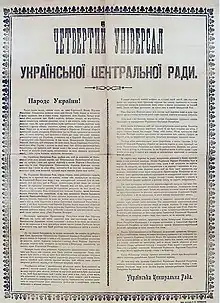Fourth Universal of the Ukrainian Central Council
The Fourth Universal of the Ukrainian Central Council (Ukrainian: Четвертий Універсал Української Центральної Ради, romanized: Chetvertyi Universal Ukrainskoi Tsentralnoi Rady) is a state-political act that declared full state independence of Ukrainian People's Republic.[3][4] It was adopted by the Lower Council (Committee) of the Ukrainian Central Council in Kyiv on 22 January [O.S. 9 January] 1918.[lower-alpha 1][6] Its appearance, in particular, was preceded by the start of peace negotiations of Ukrainian People's Republic with the Central powers in Brest-Litovsk (today in Brest, Belarus).[3]
| Fourth Universal of the Ukrainian Central Council | |
|---|---|
 IV Universal | |
| Presented | 24 January [O.S. 11 January] 1918 |
| Ratified | 22 January [O.S. 9 January] 1918 |
| Location | Engrossed copy: Central State Electronic Archives of Ukraine[1] Rough draft: Central State Archives of Higher Organs of State Power and Administration of Ukraine[2] |
| Author(s) | Mykhailo Hrushevskyi et al. |
| Signatories | Lower Council of the Ukrainian Central Council |
| Purpose | To announce and explain independence of Ukrainian People's Republic |
Description
The document it was noted that " from now on Ukrainian People's Republic is becoming self-existing, from no one dependent, free, sovereign state of Ukrainian people" and has been announced the desire for peaceful coexistence with all neighboring states that do not have right to intervene in its internal affairs.[3] With this Universal there was confirmed the authority of state power of the Ukrainian Central Council until the convocation of the Ukrainian Constituent Assembly.[3] The General Secretariat of the Ukrainian Central Council as its executive office was transformed in Council of People's Ministers of the Ukrainian People's Republic, which was entrusted with the task to continue negotiations with the Central powers as fully independent and conclude a peace treaty.[3]
The Universal contained appeals to the government and citizens of Ukraine to combat Bolsheviks and other "adversaries" who ravage and wreak havoc in the land.[3] There has been declared the complete dissolution of the regular army[lower-alpha 2] and creation in its place a people's militia.[3]
In the economic sphere, the task was to transfer industrial enterprises to a peaceful state, anticipated establishment of state control over banks, the most important branches of trade, export-import, and state monopoly on metal, coal, and other strategic type of products.[3] It was reported about already developed land law which will convey the land to the laboring peasantry without compensation on the grounds of cancellation of private property and socialization before the beginning of the spring fieldwork.[3]
By the document, it has also been confirmed all public liberties declared in the Third Universal of the Ukrainian Central Council, scheduled re-election to the people's councils, all citizens have been called to treat the elections to the Ukrainian Constituent Assembly with attention.[3]
The Fourth Universal of the Ukrainian Central Council clearly defined the creation of a sovereign country as the ultimate goal of all Ukrainians.[3]
International recognition
At about the same time on 22 January [O.S. 9 January] 1918 it was announced that Great Britain recognized the Ukrainian People's Republic.[7] The former British council-general for South Russia in Odesa John Picton Bagge who was appointed as temporary chargé d'affaires arrived to Kyiv.[7] He met with the General Secretary of International Affairs of Ukraine Oleksander Shulhyn.[7]
Further reading
- Doroshenko, D. My recollections about the recent past (Мої спомини про недавнє минуле) Archived 2021-01-17 at the Wayback Machine. Lviv 1923-24. (in Ukrainian)[4]
- Yakovliv, A. Fundamentals of the Constitution of the Ukrainian People's Republic (Основи Конституції УНР). Paris 1935. (in Ukrainian)[4]
- Hrushevskyi, M. At the doorstep of a new Ukraine: ideas and dreams (На порозі нової України: гадки і мрії). Kyiv 1991. (in Ukrainian)[4]
- Myronenko, O. Declaration of Independence of the Ukrainian People's Republic in January of 1918 (Проголошення самостійності УНР у січні 1918). Kiev 1997. (in Ukrainian)[4]
- Ukr. parliamentarian: past and modernity (Укр. парламентаризм: минуле і сучасність). Kyiv 1999. (in Ukrainian)[4]
Notes
References
- 22 January 1918 Ukrainian Central Council declared independents of Ukraine (22.01.1918 – Українська Центральна Рада проголосила незалежність УНР). Museum "Territory of Terror" website. 22 January 2013
- Rough draft copy. Central State Archives of Higher Organs of State Power and Administration of Ukraine. (in Ukrainian)
- Fourth Universal of the Ukrainian Central Council (ЧЕТВЕРТИЙ УНІВЕРСАЛ УКРАЇНСЬКОЇ ЦЕНТРАЛЬНОЇ РАДИ). Poltava Raion State Administration.
- Myronenko, O. (ЧЕТВЕРТИЙ УНІВЕРСАЛ УКРАЇНСЬКОЇ ЦЕНТРАЛЬНОЇ РАДИ). Legal Encyclopedia.
- Ukraine in the Flames: "1917 in Kyiv" by Serhii Plokhii. Ukrainian Research Institute (Harvard University). (in English)
- SPEECH BY AMBASSADOR LUKIANENKO. The Ukrainian Weekly. January 31, 1993. (in English)
- Zinchenko, O. The Independence No. 1: When Hrushevskyi announced it, why Vynnychenko doubted it, and Yefremov was against it (Незалежність №1: Коли Грушевський її оголосив, чому Винниченко сумнівався, а Єфремов був проти). Instorychna Pravda (Ukrayinska Pravda). 26 January 2015
External links
- Universal of the Ukrainian Central Council (IV) (Універсал Української Центральної Ради (IV)). Verkhovna Rada. (in Ukrainian)
- Taras Hunczak. Appendix: The Four Universals. (in English)
- Shurkhalo, D. The Fourth Universal of the Ukrainian Central Council – declaration of independence of the Ukrainian People's Republic (IV Універсал Української Центральної Ради – проголошення незалежності УНР). Pavlo Hai-Nyzhnyk personal website from Radio Liberty. 21 January 2013.
- Melnyk, Ihor. The first day of Independence (Перший день Незалежності). Zbruc. 25 January 2017
- On 22 January Ukraine will celebrate the 100th Anniversary of the declaration of Independence of the Ukrainian People's Republic (22 СІЧНЯ УКРАЇНА ВІДЗНАЧАТИМЕ 100 РОКІВ ПРОГОЛОШЕННЯ НЕЗАЛЕЖНОСТІ УКРАЇНСЬКОЇ НАРОДНОЇ РЕСПУБЛІКИ). Ukrainian Institute of National Remembrance. 2018
- Zinchenko, Oleksandr. Independence No.1: When Hrushevskyi announced it, why Vynnychenko doubt it and Yefremov was against it (Незалежність №1: Коли Грушевський її оголосив, чому Винниченко сумнівався, а Єфремов був проти). Istorychna Pravda (Ukrayinska Pravda). 26 January 2015
- Polishchuk, Lyubov. This first year may be also the last. Newspaper "Den". 25 January 2008.